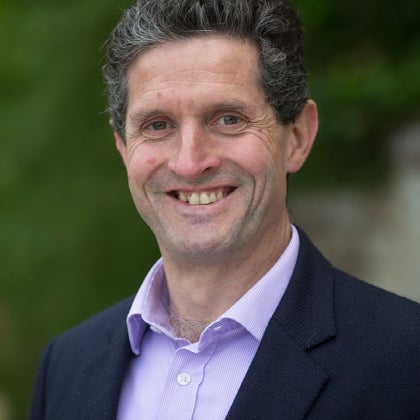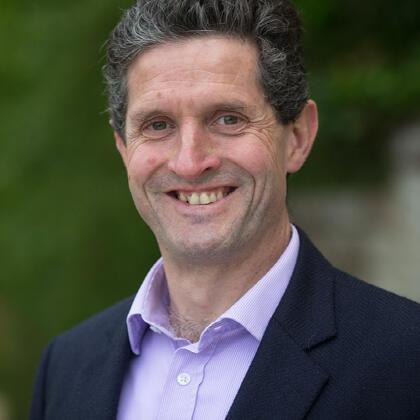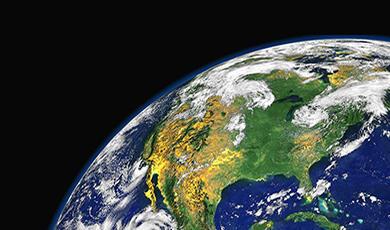A Just and Inclusive Net Zero: Who should get there first?
Share
- Details
- Text
- Audio
- Downloads
- Extra Reading
Eventually, net zero needs to include everyone: for emissions to continue in half the world while the other half mops them up is both unsustainable and unfair. But this does not mean every country should reach net zero at the same time.
Historical emitters like the UK should aim for net zero before the world as a whole, but a “staggered net zero” also carries risks for developing countries, lest they are left stranded in the race to a sustainable future.
Download Text
A Just and Inclusive Net Zero: Who Should Get There First?
Professor Myles Allen
22 May 2024
Over the course of the past five lectures on “When Net Zero?”, I hope I’ve convinced you that we have to fix climate change fast. This is not only to stop the impacts getting worse – and they are getting worse faster with every tenth of a degree of global warming, which means less than 5 years at the current rate of emissions. It is also to pre-empt some of the crazier solutions out there, like solar geoengineering, that run a serious risk of triggering global conflict.
Less dramatic, but more immediate, is the very real danger of net zero being turned into a wedge political issue here in the UK. There isn’t much we can do about those who seem determined to sow division wherever they can – except vote against them whenever we get the chance – but those who work on climate policy need to think about how to avoid playing into their hands. Which means doing a better job than we have been doing of justifying net zero to everyone, including the Brexit-voting anti-ULEZ campaigner. If the next government is too heavy-handed about it, net zero could well trigger a populist backlash in 2029, and neither we, nor certainly the global environment, can afford a UK government of old-school climate deniers in the early 2030s.
The solution is absolutely not, as Chris Stark, the outgoing CEO of the Climate Change Committee recently suggested, just to stop talking about net zero altogether and focus on reducing emissions. This seems both counterproductive and bordering on dishonest. Dishonest because we have to level with people where we are going, not just keep quiet in the hope that by the time they notice it’ll be too late to change course. And counterproductive, because just focussing on reducing emissions now means we don’t invest in the technologies we will definitely need to get all the way to net zero. Everyone, especially young people, needs to know how we are going to fix the climate problem, not just “mitigate” it. Net zero global emissions is what it takes to halt global warming, and net zero UK emissions is what it takes to end the UK’s direct contribution to ongoing global warming.
To be fair, I can see where Chris Stark is coming from. The reason net zero has become such a divisive term is that it has been used to justify all kinds of policies that people want to plug for other reasons. I think Sadiq Khan is doing a good job, and most Londoners seem to agree, but I wish his advisers would stop telling him the ULEZ is part of a net zero strategy. It’s not. The ULEZ is about local air quality. That doesn’t make it any less of a good idea: I have a son with asthma. ULEZs work – for local air quality. I can’t find if the study has been done, but I suspect even if it were, quantifying the impact of the ULEZ on UK-wide CO2 emissions would be very difficult to do and highly sensitive to how the study was designed. If the ULEZ encourages people to scrap old cars sooner, do we include the emissions embedded in the new cars they replace them with? The ULEZ has reduced CO2 emissions from cars standing in traffic jams in central London, but to what extent is this compensated for by cars making longer journeys around the M25?
As David Cameron discovered, if you blame all your unpopular policies on the EU, don’t be surprised if people end up voting for Brexit. And if we blame all our unpopular policies on Net Zero, without bothering to explain why they are really needed, don’t be surprised if Nigel Farage spots another opportunity.
So, the challenge we face is to ensure that, in achieving net zero in time to meet our climate goals, which means by or soon after mid-century, we come up with inclusive solutions that, however imperfect, can be seen to be reasonably fair on everyone. The greatest danger to mankind is man – I’m using sexist language deliberately here – so if someone offered me a sure-fire solution to climate change that just happens to exacerbate the inequalities and power imbalances that are fuelling conflict today, I would say let’s find another solution.
Most lectures on climate justice focus on the massive inequalities of climate impacts and how these can be addressed through institutions like the UN’s new Loss and Damage facility, the launch of which was one of the main (little talked about) achievements of the recent COP28 meeting in Dubai. This is, of course, extremely important, but it is not what this lecture is about: here I’m talking about potential, perceived and real injustices of climate solutions. But I don’t want you to forget how unfair the impacts are, because one of the most dangerous myths of all about climate change is that “we’re all in this together” – dangerous because, for reasons we can probably trace back to our evolutionary past, humans seem curiously relaxed about collective threats that affect everyone. It is vital that everyone understands that we are not all in this together – the human consequences of both the causes and impacts of climate change could not be more unequal, with both massive winners and devastated losers – because the one thing that will focus minds is the knowledge that you, or the people you love, might be in the latter category.
Lest I start to sound too cynical, one of the things I find most reassuring is that we instinctively prefer outcomes that don’t exacerbate inequality or injustice even if we don’t know whether we are likely to be winners or losers. I’m thinking back to John Rawls here. And the challenge we face in climate policy – and this lecture is very much an appeal to the “climate establishment”, that collective of academics, civil servants, environmentalists, sympathetic journalists, politicians and business-people that I seem to meet at events like COP and London Climate Action Week, to step up to this challenge – is to rethink our approach to net zero with justice and inclusion as core organising principles, not just afterthoughts to be addressed with reskilling programs for redundant coal-miners.
I’ve been told not to use the phrase ‘climate establishment’ because it annoys people. I’m sorry, but I’m going to keep using it, because I do think we have a problem with establishment groupthink. Particularly evident in our tendency to focus on technocratic climate solutions designed by elites – elite countries, and elites within countries – on behalf of everyone else. Far too often I hear people emphasise how climate change is a complicated problem, with the subtext “so it needs clever people like me to work out how to solve it.” I cannot emphasise enough that stopping fossil fuels from causing global warming is actually a very simple problem, although I’m happy to acknowledge that understanding and adapting to the impacts of climate change can get very complicated indeed. It’s a big problem, because of the extraordinary scale of the process that is causing it, but it is not so complex that the ordinary voter should just trust the experts and not trouble themselves about the details. People often talk about the cross-party consensus on climate in the UK as a good thing, and if the alternative is still having to argue about whether global warming is happening at all, then of course that is true: but one of the consequences is that we have never had much of a discussion with ordinary voters about how we get to net zero. And that is becoming a problem.
Many of the flagship solutions to climate change that we talk about today, from parochial issues like the phase-out of gas boilers and internal combustion engines in the UK, to the much-vaunted European Carbon Border Adjustment Mechanism, could very easily, at least in the short term, exacerbate inequality and injustice. There is no getting away from it: switching to a heat pump and electric car is a lot easier for someone in a detached house with a charging point in the driveway and plenty of capital to spend. And the Carbon Border Adjustment Mechanism, or CBAM, is, in a nutshell, the European Union deciding that it has the right to impose punitive tariffs on imports from countries whose climate policies a team of bureaucrats in Brussels have decided aren’t good enough. I recently heard a talk from one such bureaucrat, I’m sure a very well-intentioned and intelligent chap, in which he said “of course, the CBAM is not neo-colonialist.” If you have to assure people your policy is not neo-colonialist, you have a problem.
This is the reason I don’t like to use the phrase “climate emergency” – and I have to give a shout-out to Alice Evatt here for encouraging me to think about this. Alice is currently working with us in Oxford Net Zero, but completed her Doctorate in moral philosophy last year, with John Broome, on among other things this climate emergency framing. The thing about an emergency is that it justifies all kinds of measures like the suspension of normal consultation practices and even, in extreme cases, curtailing human rights. Emergencies happen, of course, but one of their defining characteristics is that they are temporary. As we saw with Covid, public support for “emergency powers” is – rightly – extremely limited. When a country remains in a “state of emergency” for decades, the term is being dangerously abused. And solving climate change is going to take decades, so, Alice would argue, it is an equally dangerous abuse of language to call it an emergency. Dealing with an ageing population will be a comparable challenge for the UK to achieving net zero, measured in purely monetary terms, yet we don’t talk about the “demographic emergency” and expect government to seize emergency powers to deal with it.
We have to discuss solutions with the public, accept compromises, and not just go with the “optimal” plan, no matter how expertly determined. We have to take the trouble to ensure that climate solutions are not just assessed to be fair using some formula dreamt up by unelected technocrats like the Climate Change Committee, the Science-Based Targets Initiative, or the Climate Action Tracker. They also have to be seen to be fair by voters and by those most affected by them. And that means members of the climate establishment (sorry) talking to people who wouldn’t normally show up in their social networks, like populist talk-show hosts, livestock farmers – and the executives of fossil fuel companies.
Because, ultimately, climate policy is for everyone. This doesn’t mean everyone has to immediately benefit from it – although, of course, we all benefit from a stable climate in the long term. One of the most dangerous myths around is that achieving net zero is actually going to be really cheap because carbon-free, instantly dispatchable energy is about to get too cheap to meter. We’re going to talk about this a lot next year but, spoiler alert, it isn’t. Achieving net zero is going to come at a cost – and whatever the package of solutions we end up with, some will do better out of them than others. But that is the case for almost any public policy. If we insist that every policy must impact absolutely everyone absolutely equally, we would never do anything at all. What we cannot afford to do, for a policy that will be resolved over decades, is to create a disgruntled rump of the population who feels permanently disenfranchised by it. The most effective climate policy in Britain over recent decades was almost certainly Mrs Thatcher’s decision to replace coal with gas in our electricity supply. 40 years on, with emissions down, air quality massively improved and gas prices back down to what they were before Putin’s invasion of Ukraine, it looks like a pretty sensible decision. But the way she went about it left scars that have lasted a generation. We have to be grateful people only realised the climate benefits as an afterthought: imagine what would have happened to views of climate policy in the UK if Thatcher’s dash-for-gas had been presented as “Sorry, Mr Scargill, There Is No Alternative because that’s what it says in the Climate Change Committee’s next carbon budget.”
So, my appeal to the climate establishment – and I’ll stop calling you an establishment when you stop behaving like one – is to start thinking a lot harder about who is being disenfranchised by our technocratic, expert-led approach to climate policy. And the solution is not just to adjust the “coefficient of aversion to inequality” (yes, there is one, and it’s really important) in your Integrated Assessment Models. We have to make the logical basis of decisions clear to people, and stop just telling them, lazily, “this is what you have to do because it is aligned with the Intergovernmental Panel on Climate Change’s 1.5°C scenarios.”
One particularly lively topic of discussion in the climate justice space – and which illustrates the fundamental problem of technocratic thinking – is the debate over “fair shares” of future emissions. The Climate Action Tracker – a “scientific project” led by a group of NGOs based in Berlin that has an extraordinary influence over climate policy in the EU and in progressive circles around the world – makes lots of noise every COP updating its ratings of countries efforts and plans to reduce emissions, with a traffic light system to score countries’ progress against their “fair share” under a Paris-aligned scenario. I had a complete non-conversation at COP28 with a very intelligent and absolutely committed contributor to the Climate Action Tracker asking her how she would explain the CAT methodology to an Alternative für Deutschland voter. She was completely mystified: “Why would I want to? Those people aren’t interested in climate policy.”
We’re going to spend next year’s lectures talking about climate solutions, but a good starting point is to ask whether Climate Action Tracker, or the Science-Based Targets Initiative, a kind of CAT-for-the-private-sector that rates companies’ efforts on whether they are Paris-aligned (and also, slightly awkwardly, advises companies on how they can get a good SBTi score) are asking the right question. Fundamental to these efforts is the notion that everyone, by virtue of their existence, has a right to cause a certain amount of irreversible damage to our planet, and the question to be addressed is whether you have exceeded your fair share.
CAT is at least explicit in that is what they are doing. SBTi would probably argue that their “tests of Paris alignment” are based on scenarios, not a fair-share analysis, but that just means their assumptions about what is “fair” are buried in the models used to generate those scenarios. These scenarios typically represent “feasible least-cost pathways” that achieve a specified climate goal in the most cost-efficient manner possible subject to certain constraints. Some costs, like replacing coal-fired power stations with nuclear, can be determined reasonably objectively – although the cost of a possible impact on nuclear proliferation still involves a lot of judgement. Other costs, like the cost of flying less, are completely subjective. Is my flying more valuable to the world than your decision to drive to work rather than taking the bus, because I’m an important Professor who needs to get to climate conferences (and, by the way, everyone in this room would need to spend a lot of time on buses to compensate for my flight emissions)? What is my fair share of the world’s flight-related emissions budget? What is aviation’s fair share of the global emissions budget? All these questions are answered implicitly in “Paris-aligned” scenarios, so when SBTi rates a company for Paris alignment, somewhere deep in the engine room of an Integrated Assessment Model, the answers are lurking. No one, of course, including the modellers, have any idea what the answers are. But we do know who the modellers hang out with. And you can tell: most of these models, for example, assign a zero cost to giving up eating meat – which makes sense, the modeller will tell you in perfect, patient, slightly accented English, because a plant-based diet actually makes people healthier. But does it make sense to everyone?
I think the question of what is my, or the UK’s, or some company’s, fair share of irreversible damage to the global climate system is complete nonsense. And remember, every tonne of carbon dioxide we release into the atmosphere by burning fossil fuels has an irreversible impact, whether or not that carbon remains in the atmosphere or is temporarily stored in a tree. That doesn’t mean we don’t do things that cause irreversible harm – we just shouldn’t pretend we have a right to cause irreversible harm simply by virtue of having been born. And if we do discover that something we are doing, or something we are selling, is causing irreversible harm, we have a positive duty to fix it.
We need to change the conversation around justice in the net zero transition from a negative duty not to exceed your fair share of harm, to a positive duty to fix things that are causing harm as fast as possible so they no longer do so. And how do we stop fossil fuels from causing global warming? There really is only one way: we have to capture the carbon dioxide they generate and dispose of it, permanently, back underground. You might argue “but we could just stop using them” – but that is just leaving them for someone else to use or worse, forcing someone else to use them to supply you with the products you want but no longer produce because you’ve given up using fossil fuels. Remember, in the Paris-aligned scenarios of the IPCC, we are still using fossil fuels, at around one-quarter of the current rate, in 2100, long after the date of net zero. We are just disposing responsibly of the carbon dioxide they generate and not dumping it into the atmosphere.
So, in the end, arguably the only metric that really matters of whether a country or company is on track for a durable net zero in 2050 is the fraction of the carbon dioxide generated fossil fuels use or cement production in that country or company – and embedded in the products they sell – that is going back underground. And, despite my nagging them about it off and on for years, neither CAT nor SBTi nor CDP nor any of a host of voluntary and compliance rating agencies that are supposed to be tracking our progress towards net zero even ask what this geologically stored fraction is and how it is changing. Their answer is that, first, it is more important to focus on reducing emissions and, second, that my obsessive focus on this geologically stored fraction risks promoting carbon dioxide capture and storage as a climate solution.
To the second point first, I’d counter that we wouldn’t complain that monitoring sewage discharges might encourage water companies to focus on sewage treatment. We are going to generate more carbon dioxide by burning fossil fuels than we can afford to dump in the atmosphere – on that, everyone agrees – and capture and geological storage is the only known way of getting rid of it permanently on any scale. To the first point, I’m not saying that emissions don’t matter – of course they matter, since they determine how much a country or company is contributing to the ongoing rate of global warming. But it is the rate of increase in the geologically stored fraction that determines when we will get to a durable net zero. Reducing the amount of carbon dioxide we produce makes it easier to get rid of the remainder – just as encouraging people to flush less often reduces the amount of sewage the water company has to deal with. But it still has to deal with it. All other climate solutions are, to some extent, interchangeable: if we don’t like solar panels, we can invest more in nuclear power. But we will still have to capture and dispose of carbon dioxide.
So, as a matter of justice, I am less concerned about discussing fair shares of the rapidly diminishing remaining atmospheric space as I am about making sure that all those who currently benefit most from continued fossil fuel use (and potentially, although I can see this opens another can of worms about who-knew-what-when, those who have benefited from fossil fuel use in the past) are contributing to stopping fossil fuel use from causing further global warming as fast as possible. Right now, both CAT and SBTi would approve of a country or company that simply had a plan to stop using fossil fuels altogether, by closing down all steel production and importing steel from China or selling off all their fossil fuel assets to other companies that don’t worry so much about their SBTi rating. There is no justice in causing a problem and then walking away from it. Ratings need to measure how fast we are fixing the problem, not how slowly we are contributing to making it worse.
The greatest climate injustice of all, to my mind, is the fact that the most profitable industry the world has ever known is entirely dependent on selling a product that is causing a very serious problem and no one is even asking them to fix it. And what is strange is that almost everyone in the climate debate, from the Anti-ULEZ demonstrator, through the negotiators at COP28 deciding to “transition away from fossil fuels in energy systems”, all the way to the Just-Stop-Oil protestor glued to the motorway gantry, is actually helping to perpetuate that situation. The Anti-ULEZ demonstrator thinks they are defending their right to drive, whereas what they are actually doing is defending their right to sit in a traffic jam and contribute to fossil fuel company profits. The Just-Stop-Oil protestor thinks they are helping to get rid of fossil fuels, whereas what they are actually doing is providing fossil fuel company executives with an excuse not to invest in carbon capture. I’ve had these executives tell me, with a straight face, “it’s too risky for us to invest in CCS because the world has decided to transition away from fossil fuels anyway”, knowing full well they are putting money into exploration of fields that won’t be producing until the 2040s. It suits them just fine for the discussion to be about when and how fast we should phase out fossil fuels, as long as they are left alone to make money selling them in the meantime. As a matter of justice, those who profit from selling fossil fuels should be putting their money into stopping the product they sell from causing global warming, not just promising to stop selling it at some hypothetical time in the future, “in line with society”.
So here is a thought: could “justice for the fossil fuel industry” be something we might all get behind? All too often, “Just Transition” is about protecting workers in carbon intensive industries, or the interests of new fossil fuel producers, in ways that that just happens, surprise, surprise, to suit the fossil fuel industry itself rather well. So perhaps we need to extend the concept of a Just Transition to encompass justice for the owners of the industry itself – the so-called “rent-holders” who benefit when fossil fuels come out of the ground. I’m not interested in reparations or heads-on-stakes, I’m just interested in the industry taking responsibility for cleaning up after itself.
In effect, by enacting net zero legislation, we have already decided that no one is allowed to sell products that cause global warming after 2050. So, anyone who is selling a product today that causes global warming should have filed a detailed plan with Government explaining how they intend to stop that product causing further global warming within the next 25 years. And just promising to stop selling that product in 2049, leaving consumers (and pension-fund-holders) stranded high and dry, isn’t good enough.
Because that Anti-ULEZ demonstrator and Just-Stop-Oil protestor may just have more in common than either would care to admit. Both are convinced that the world is deeply unfair. The Anti-ULEZ demonstrator hates Big Government telling them what to drive, while the Just-Stop-Oil protestor hates Big Oil telling them and their children what to breathe. Perhaps both of them could agree that Big Government should butt out of the affairs of individual consumers and focus on requiring Big Oil to clean up the mess caused by the products they sell. Time and again I get told, rather condescendingly by members of the climate establishment, that it’s not that simple. Actually, it is.
© Professor Myles Allen 2024
Part of:
This event was on Tue, 21 May 2024
Support Gresham
Gresham College has offered an outstanding education to the public free of charge for over 400 years. Today, Gresham College plays an important role in fostering a love of learning and a greater understanding of ourselves and the world around us. Your donation will help to widen our reach and to broaden our audience, allowing more people to benefit from a high-quality education from some of the brightest minds.


 Login
Login







